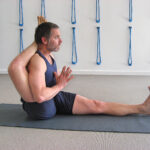Whether you’re a triathlon veteran or a first-timer, you’re probably starting to get pretty excited about the IRONMAN 70.3 in the Sunshine Coast, which will take place soon on September 11th.
Let’s tick off some of the incredible aspects of this IRONMAN event:
– Stunning location beginning on the picturesque Mooloolaba Beach
– A world-class IRONMAN course
– 30 Age Group qualifying slots for the 2023 IRONMAN World Championships
– Perfect weather at 26 degrees Celsius
We can understand why you’d be keen to get involved with this triathlon, even if you’ve never tried an IRONMAN event before.
However, it can be overwhelming to know where to start. So here are some top tips in preparing for the IRONMAN 70.3 from our very own Physio, Dave, who’s been busy preparing for this event.
What does the IRONMAN 70.3 consist of?
This event will begin with a 1.9km swim course in the surf at Mooloolaba Beach. With an average water temperature of 22 degrees Celsius, it shouldn’t be too challenging.
Next, the IRONMAN triathletes will take their bikes and head to the roads at Parkyn Parade Park, beginning a 90km cycle on a relatively flat course along the Sunshine Motorway, followed up by a ride along the beachfront.
For the running portion of the event, triathletes will run along a moderately hilly course, visiting the breathtaking views of the Alexandra Headland Hill where you can take in the subtropical scenery as a distraction from the pain.
The adrenaline and satisfaction of finishing an IRONMAN event are motivation enough, but a good view definitely doesn’t hurt.
Check out more about the course here.
How can you prepare for a triathlon like the IRONMAN 70.3?
Here are some of our top tips to prepare for a triathlon:
Get a buddy. One of the best things that you can do to prepare for a triathlon is to join in with the local community, which is often thriving. There are many triathlon clubs, and you might be able to join one in your local area. If there isn’t a club near you, choose a friend to support you – ideally, they’ll join in on the triathlon as well and you can keep each other motivated as you train.
Identify what area you need to work on the most, and use that as the focus of your training. Many people are concerned about the swimming aspect of a triathlon, so you might find it helpful to focus on outdoor swimming training sessions. It’s important not to procrastinate training for your least favourite section of the triathlon. Lean into the discomfort until you feel confident across every section. Many injuries occur outside of somebody’s ‘best’ section of a triathlon. For example, runners may be more likely to be injured when cycling and cyclists may be more likely to strain something when they are swimming. Doing more training in each discipline will improve your movement preparation for each area, help prevent injuries and improve performance.
Give yourself enough time to train. We suggest planning for the triathlon at least 4-6 months ahead, to make sure that you have the fitness you need to feel ready to tackle the IRONMAN 70.3 with confidence. If you don’t have time to finish training before this IRONMAN, you can always begin training for the next one now!
Plan in your recovery. It can be go go go when it comes to training as you try to push for your best performance but as important as it is to train, it is as equally important to recover. During your recovery periods is when your body makes the physiological adaptations to the hard work you’ve been putting in and takes some load off your joints and tendons which also need time to adapt to the training. So, plan in days off during your training weeks and an easier week with reduced training load every 3-5 weeks. Make sure you’re also planning a taper leading into the event.
Use brick workouts. A brick workout is one that involves at least two disciplines at once, such as swimming and cycling. Many first times triathletes underestimate the challenge of rapidly switching from one activity to another, and discover that they are doing a wobbly walk of shame as they try to transition between them. So when you’re training, don’t skip the brick workouts – and you’ll have a competitive edge as you transition more effectively and save on precious time.
Watch out for common injuries. Some of the most common injuries to be found from a triathlon include:
– Overuse injuries. Each component of the triathlon brings its own risk of overuse injury. Common injuries we see include tendinopathy, plantar fasciopathy, knee pain, foot pain, stress fracture and swimmer’s shoulder. While these injuries are very common, the good news is that they can often be prevented.
– Pain and discomfort. If you’ve trained for a triathlon, you’re probably pretty familiar with pushing through the pain. But when something is strained or heavily overused, the pain can be very difficult to manage and may linger after the triathlon is over. The most common culprits for pain during a triathlon are the neck, middle and lower back, heels, knees, shoulders, hands, wrists, and forearms.
Other common injuries include:
– Sprains and strains
– Collarbone fracture
– Rotator cuff injuries
– Iliotibial Band Syndrome (ITS)
– Wrist pain
– Shin splints
– Patellar Tendinopathy
See an exercise physiologist or physiotherapist. Did you know that you can see an exercise physio or a physiotherapist even without an injury? It’s a common misconception that you might wait to seek support until after the injury when you need rehabilitation, but there are a lot of reasons you might see a physio before the big event. As professionals who are trained in anatomy and physiology, exercise prescription, and sports injuries, we are the go-to people to help you to stay as safe and as confident as possible when competing. Of course, we are also the perfect people to cheer you on and give you a strong competitive edge when training.
As well as the acute injuries that you might develop when you are competing, there is wide a range of overuse injuries that can occur when you are pushing yourself beyond the max. We are familiar with these and can provide you with a detailed assessment and support to assist you in avoiding these common injuries wherever possible.
We can also suggest strengthening and conditioning exercises that are specific to the activities you will be doing. This advice can make a world of difference to your performance. With our support, you can focus on smashing your best records. An IRONMAN is both a phenomenal and tough thing to tick off your bucket list, and especially if it’s your first one, you’re better off doing it with support from the professionals.
If you’re thinking about smashing your personal best, reducing your injury risk, or getting advice and support for training and preparation, book online or call us on 3046 1700 to make an appointment today.





